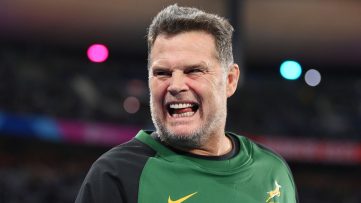
Drastic Decision at Springboks: “I Didn’t Want This” – The Challenges Facing South Africa in 2027
As 2024 comes to a close, the Springboks find themselves at a pivotal moment in their journey toward the 2027 Rugby World Cup. A significant and unexpected decision has been made, one that could alter the course of South African rugby in the coming years. The words, “I didn’t want this,” reflect a deep sense of reluctance and frustration, as the team faces a crossroads with critical consequences for their future.
In rugby, decisions of such magnitude don’t come without their challenges. While South Africa’s rugby community remains deeply proud of the team’s success, including their triumph at the 2019 Rugby World Cup, the road to 2027 is fraught with new obstacles. With such an important decision now hanging over the team, many are questioning whether the Springboks are equipped to maintain their dominance on the global stage in the years ahead.
The Drastic Decision Shaping the Future of the Springboks
Although the full details of this major decision remain unclear, it is widely speculated that the move is related to changes in the coaching staff or player selection. There is a sense of shock and even disbelief within the rugby world, with many questioning the timing of such a shift. Rassie Erasmus, who masterminded South Africa’s World Cup victory in 2019, is said to be facing immense pressure in his role, as he seeks to maintain the high standards that have come to define his tenure.
“I didn’t want this,” Erasmus reportedly stated, acknowledging the weight of the decision. These words reveal the difficult position the coach finds himself in, as he is forced to confront decisions that could affect not only his future but also that of the team. It is clear that such moves are never easy, especially for a coach of Erasmus’s stature, who has built a squad around his tactical approach and leadership style.
A Shaking of Team Cohesion
The Springboks have long been admired for their unity and sense of camaraderie, key components in their success on the field. However, any major shake-up, whether in terms of coaching or player dynamics, risks disrupting the cohesion that has been cultivated over the years. The impact of such a decision could reverberate throughout the squad, creating uncertainty and potentially weakening the team’s mental readiness.
Erasmus must carefully manage this transition to ensure that the team remains focused and united in the lead-up to 2027. The Springboks have always thrived on their sense of brotherhood, and any actions that undermine that bond could have serious consequences, especially in high-pressure situations. Maintaining cohesion will be just as important as physical and tactical preparation as the World Cup approaches.
Is This the Right Time for Change?
The timing of this drastic decision raises questions: is it a necessary move, or a risk that could destabilize the team? The road to the 2027 Rugby World Cup requires adaptability, and some argue that this change is an attempt to invigorate the squad with fresh energy and ideas. However, others worry that such a disruption so close to a major global tournament could hinder the team’s performance rather than improve it.
Erasmus, as a seasoned strategist, must weigh these factors carefully. While change can be beneficial, it can also be a double-edged sword, especially when it involves significant shifts in leadership or player roles. The real challenge for the Springboks will be ensuring that this transformation does not cause disruption but instead leads to a more dynamic and competitive team for the future.
Rassie Erasmus Under Intense Pressure
Rassie Erasmus has earned his reputation as one of the best minds in world rugby, having led South Africa to their third Rugby World Cup title in 2019. However, the pressure on him to replicate that success in 2027 is immense. “I didn’t want this” is more than just a statement of frustration; it reflects the burden of expectation that comes with being in charge of a national team with such a storied history.
Erasmus faces a delicate balancing act: maintaining the team’s core strengths while embracing necessary changes to adapt to the evolving landscape of world rugby. His decisions moving forward will be critical, and he will need to demonstrate both resilience and innovation to guide the Springboks toward success in 2027.
What’s Next for the Springboks?
The Springboks now stand at a crossroads, and the decision made at the end of 2024 could prove to be a defining moment in their World Cup preparation. The shift, though difficult, could be the catalyst for positive change, but only if handled with care. For the Springboks to remain one of the world’s top rugby nations, they will need to ensure that this decision leads to greater strength and unity, rather than division.
The South African rugby community will be closely watching as the Springboks navigate these turbulent waters. With just a few years left until the 2027 Rugby World Cup, Erasmus must work quickly to implement changes that will allow his team to evolve and remain competitive at the highest level.
While the future remains uncertain, one thing is clear: the Springboks will need to adapt, innovate, and maintain their trademark unity in order to secure a strong position for the World Cup. Rassie Erasmus has made a tough call, but the key will be whether he can manage the transition effectively and lead the team to even greater success in 2027. The road ahead will not be easy, but it’s one that can define the next chapter of South African rugby.
Leave a Reply